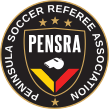Red Cards Below the term 'red card' refers to the send off of a player or the expulsion of an adult and an actual red card may not have always been shown. The correct terminology is 'send off' for the player and 'expulsion' for the credentialed adult.
What Happens When Someone Gets A Red Card?
Every tournament and league has different regulations and procedures. A "typical" procedure:
- The person's pass is confiscated by the referee.
- The referee completes a Send-Off Report (an explanation of what happened and why the red card was given) and mails the pass and report to the League/Tournament Disciplinary Chair.
- The League/Tournament Disciplinary Chair determines and posts the appropriate penalty or suspension and sends the pass to the individual's registration league.
- The team may retrieve the pass from its Registration League President once the suspension is served.
For what can you get a red card?
A player can receive a red card for:
- Serious Foul Play. This incldues a penal foul committed with excessive force or a tackle that endangers the safety of an opponent.
- Violent Conduct. Against anyone, including opponents, teammates, spectators, adults, and referees.
- Spits at anyone. Doesn't have to hit anyone.
- Denies an obvious goal scoring opportunity by handling. Typically, stopping the ball from entering the goal with your hand.
- Denies an obvious goal scoring opportunity by fouling. The referee judges the distance to the goal, the distance to the ball, the number of defenders and the direction of play to determine if it was an obvious goal scoring opportunity.
- Abusive or foul language or gestures. If it can be publicly heard and especially if it is directed at someone, the referee can sanction the individual.
- Receiving a second caution in the same game. The referee will show a yellow card and then show a red card. There are many technical infractions of the Laws of the game where the Referee is required to issue a caution.
The referee must choose one of the above violations of Law 12 to send off a player. The referee can include details about other conduct as part of the send-off report. If the referee makes a mistake (sends off the wrong player, sends off for a second caution when there was no first caution), the referee CAN NOT rescind the decision to send-off. The referee can include the details in his send-off report.
Team officials are sanctioned for irresponsible behavior or for bringing the game into disrepute. This is a much broader category. Clearly if a team official does any of the above they will be expelled.
How Are Suspensions and Penalties Determined?
The suspension and other penalties will be determined by the League/Tournament Disciplinary Chair. Suspensions are based on Printed guidelines, historical data, and common sense.
For CYSA matches, incidences of assault will be handled by CYSA. The minimum lengths of suspension is listed in the CYSA-N Specific Rules Section 4:05
Red Card Suspensions Posting
Click here to see a listing of all send offs given in NorCal Premier this season. Please allow 48 hours for the send off to be posted. This is where the length of a suspension (typically number of matches) is posted. to see a listing of all send offs given in NorCal Premier this season. Please allow 48 hours for the send off to be posted. This is where the length of a suspension (typically number of matches) is posted.
For CCSL go to the GotSoccer Event Schedules and Standings Page and click on the Misconduct icon next to Standings for the Gender and Age and Bracket of interest.
Can A Spectator Get A Red Card?
Only individuals with passes (players and team staff) can get a red card (player) or expulsion (credentialed adult).
If a spectator (child or adult) is not controlled by the team staff, the referee may either (1) abandon the game, or (2) issue a 'warning' or 'expulsion' to a team official.
It is the team officials' responsibility to control spectators.
Can a Player play in Match without a player pass?
No
Can a team official without a pass be in the technical area before, during or after a match?
No
Can decisions based on referee judgment be appealed?
No.
From Law 5 of the Laws of the Game
The decisions of the referee regarding facts connected with play, including whether or not a goal is scored and the result of the match, are final. The referee may only change a decision on realizing that it is incorrect or, at his discretion, on the advice of an assistant referee or the fourth official, provided that he has not restarted play or terminated the match.
Updated December 5, 2014 | 
